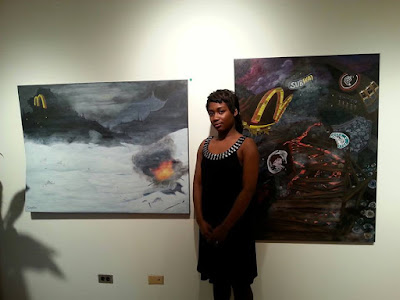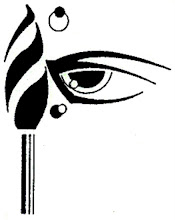The specific question I want to press is, what are some ways we define "Black Experimentalism" while examining the state of our environment?
Call in to speak with the host (917) 889-7811
 |
| Jelisa M. Davis- Chicago State University Graduate BFA |
In this exhibit, Phantom Gallery Chicago curators Alpha Bruton and Alan Emerson Hicks invited B.Rael Ali and Jelisa M. Davis, new graduates and emerging Chicago artists, as a feature because each is presenting critical thought and expressing Modernism in their artwork. In their work, they have thought critically about black experimentalism and modernism and what that means in their practice.
 |
| Artist B.Rael Ali |
B. Ra-El Ali is an exceptional emerging artist who has exhibited his artwork at Southern Illinois University at Carbondale, Illinois, South Side Community Art Center. He is currently a resident artist and curator at the Hunter International Gallery.
Modernism, like its successor, Postmodernism, is neither easily demarcated in terms of actual dates nor is it easily defined. Much of what describes Modernism also describes Postmodernism. So, what use do we find in the terminology that supposes a distinction? Despite this slippage in language, we know that Modernism as an artistic movement—embraced by a range of practitioners in literature, music, and the visual arts—is often described as a “break” from, and a revolt against, Realism.
That we engage in a discussion not only about race and gender, but about societal attitudes about race and gender, and the relationship a Modernism that cannot be extracted from these attitudes and a black Modernism that emerged alongside and against them.
The question I pose to B. Ra - El Ali because he is also a poet and spoken word artist: Who within the black literary tradition has (as well as particularly, the visual arts., which is an area of cross-pollination in need of significant investigation) made experimentalism more possible, and might we find some of those figures in the columns we call 'canonical" or "traditional"? I want to think about poets whose work we might not consider experimental and see how innovations in that work begin to shift the ground beneath what we think of as "black experimental."
Research: The Hopwood Lecture, presented April 20, 2011
Michigan Quarterly Review
NEW IDEAS ABOUT BLACK EXPERIMENTAL POETRY
ELIZABETH ALEXANDER











